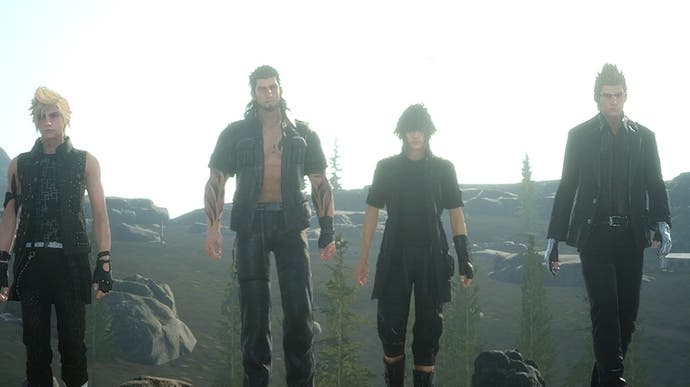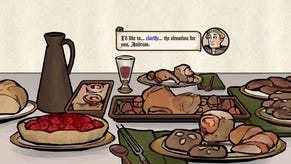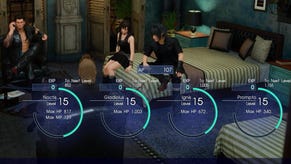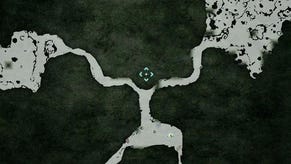Final Fantasy 15's AI is secretly a grand philosophy experiment
Thinkpiece.
Where do bodies begin in video games, and where do they end? You might point to the body of a game's protagonist, but if a player's body isn't so much a body as an expression of your agency, it seems reductive to stop at the perceptible limits of a single character model. In the medieval horror game A Plague Tale: Innocence, the player's range of action and awareness is distributed across the bodies of several characters (together with the phantom onlooker that is the third-person camera) - big sister Amicia, a gang of teenage runaways and the sickly young Hugo, who must be guarded like an Achilles heel. Where exactly are you, the intelligence directing the simulation, in this shifting equation, and what does that bode for concepts of minds and bodies at large? To play such games may not feel like reading a treatise, but it's to participate in a thought experiment about the lines we draw between the categories of consciousness, flesh and world.
Games in general are useful platforms for the systematising and testing out of philosophical precepts, and there are projects that engage with this potential more earnestly. Another recent example is No Code's existential thriller Observation, which casts you as a space station AI suddenly encumbered with a self, and struggling to feel at home in a form that spans CCTV networks, heads-up displays and robot drones. The game I want to talk about today is a less likely work of philosophising - Square Enix's Final Fantasy 15, which, it transpires, owes rather a lot to traditions of scholarly inquiry that date back centuries. That's according to Youichiro Miyake, lead AI researcher at the publisher's Advanced Technology Division, who I sat down with at Reboot Develop Blue this spring.
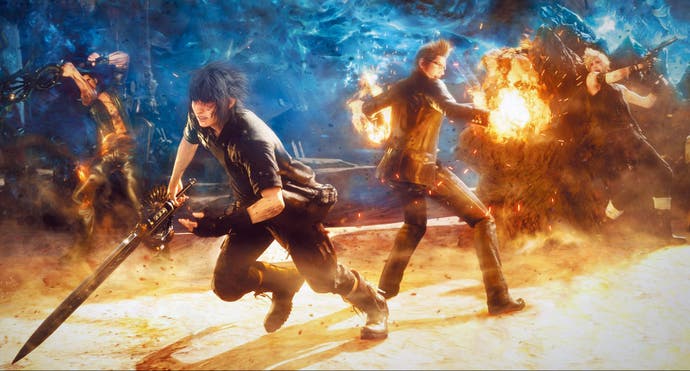
Final Fantasy 15 is yet another JRPG about a dour princeling, Noctis, but you'll probably remember it most fondly for your three bodyguards - snippy Ignis, beefy Gladiolus and the ever-buoyant Prompto. As in A Plague Tale, these "side" characters are in theory distinct personalities, but they function almost as stray appendages, loosely organised reflections of the player's will. During exploration the trio form a mobile perimeter, Prompto unable to resist galloping ahead, which occasionally makes it unclear who is following who. During battle, your accomplices fight by themselves but synch up with the player in organic ways, inviting you to perform team attacks and peeling off to help out should you take a tumble. Enter a storied area, such as the opening gas station hub, and they'll fan out, both to give you some peace and direct your attention towards objects of interest. You can delegate to them, ordering Ignis to take the wheel of your swanky muscle car, the Regalia, or asking one of your counterparts to make the call on a dialogue response. Prompto also serves as a kind of involuntary recall function, snapping pictures of your exploits and offering them to you later for preservation.
Final Fantasy 15 is more of a single-character game than its predecessors on PS3, but in transforming the famed JRPG party into a real-time, highly reactive blend of ambient device, guide and safety net, it effects a peculiar dispersal. You aren't so much leading the party as holding it together by gravity, like the largest mass in a rogue planetary system. This is reinforced by the fact that you don't perform every individual attack but hold a button while your character chains together moves, which distances you from the in-game body that is most obviously "you". The experience puts me in mind of Peter Godfrey-Smith's description of octopus cognition in his book Other Minds, something not concentrated in the animal's head but spread throughout its flesh, each limb having a certain autonomy, a will of its own.
While these ideas aren't pursued explicitly in the game, Miyake suggests that Final Fantasy XV is on some level a piece of research into the workings of consciousness and bodies. It reflects his reading of the phenomenologists Henri Bergson and Edmund Husserl and the biologist Jakob von Uexküll (if you'd like to know more, and you can read Japanese, Miyake has authored several books of his own on such subjects). The game strives, he says, to move beyond the more commonplace definitions and assumptions that inform AI design elsewhere in the trade. "A lot of artificial intelligence is thought about as if it's me and how I interact with you or that object. The reality is that life isn't really like that - there are grey zones, there are indirect interactions, there are butterfly effects."
The creation of AI allows developers and players to experiment with alternative modes of consciousness, Miyake goes on - different ways of structuring the phenomena that make up our awareness of the world and our place within it. In particular, it creates space for resistance to dualism, one of the more everyday epistemological models across Europe and North America, which splits the world into the mental and physical, mind and body. This widely embraced concept may crop up in the writing of Final Fantasy XV, but it doesn't really capture how the game represents and organises character consciousness in practice. "A video game character exists as a form with a body, as a model," Miyake explains. "And therefore it needs to have AI based upon not just thinking [in the abstract], but its body's actions." There is no room here, in other words, for a clean division of the mind from the flesh, and nor is there room for a clean division between individual and world. "It's not just you and your body, it's your body and how it interacts with the environment. Your environments change you and you affect the environment, and that is truly what life is."
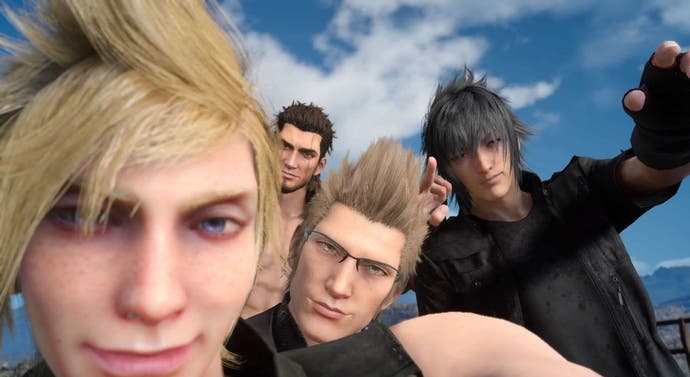
To follow his thinking you need to dip a little beneath the surface of Final Fantasy XV. "There's [several] different strata of AI in FF15," Miyake begins. "There's the character AI, which is basically personality-based - am I somebody who likes to fight a lot, am I somebody who defends or heals a lot. And that is based upon the classic model of AI or personality, which is that there's me, and there's you, and we're compartmentalised, we affect each other, and there's no breakdown." Character AI is where you'll find "abstract decision-making" processes, such as a character's understanding of offensive and defensive tactics. But it also denotes activities we might associate with the body as a dumb machine, separate from the mind. A significant chunk of the character AI, for instance, controls what we might call "involuntary" movements and reactions, such as changes of posture or standing at a certain distance from other characters. Thus, suggests Miyake, the character's mind is in a way their body.
Beyond that, straightforward mind/body/world distinctions are troubled in the game by "the meta AI layer, which is basically like an eye in the sky, like God". The meta AI governs the overlap between Final Fantasy 15's characters and the environment, the priorities of the situation and a number of other, broader elements. One of the meta layer's responsibilities is ensuring that when Noctis needs help, only one companion hurries to assist him rather than everybody at once. It also helps decide what is said when and where, placing dialogue according to the narrative designer's sense of your evolving rapport with each character as you roam across Eos. Rather than sealed-off units, the meta AI thus imagines the minds and bodies of characters as porous, blurring at the edges, caught in a tacit exchange of information with scenarios and environments.
In writing all this I am not, of course, trying to argue that a game like Final Fantasy 15 actually harbours any kind of consciousness, nor am I try to say that its contributions to AI design are unique. Meta AI is a fairly well-traveled concept, as Miyake acknowledges. It is sometimes referred to as an "AI director" - a label made famous by Valve's Left 4 Dead back in 2008, which fiendishly conflates the code deploying threats in response to player behaviour with the horror movie auteur springing ghastly surprises on the cinema-goer. ECHO, from the sadly defunct Ultra Ultra, is a more elaborate meditation on the idea of a space that monitors you. In an absolute masterstroke of uncanniness, its gilded hall of mirrors ceaselessly generates clones that mimic your visible actions. Crouch to avoid detection, for example, and the copies will learn to keep a low profile themselves. Miyake has suggested elsewhere that the thinking behind video game meta AI might transfer to the management of social spaces, giving the example of a hotel lobby AI that directs robots to help guests. Artworks like ECHO draw out the sinister side of this proposition.
If AI has its abuses, however, the act of designing and analysing it is an opportunity to reframe our conceptions of existence for the better. Theories of mind, consciousness and the body don't merely describe, but guide our behaviour. As regards the workplace dynamics of the games industry, the division of "cognitive" and "bodily" functions within AI corresponds to the division of labour within development teams. Miyake suggests that "the AI programmer represents the human's brain, whereas the animator represents the character's body". The way games are made, in other words, is revealed in how we define and structure the inner lives of these virtual entities. Given the industry's lingering fondness for exploitative working practices, it's worth wondering whether there's anything about those definitions we might change.
Looking beyond the games industry, the unambiguous splitting of consciousness from the body proposed by dualism is arguably at the root of many cultural ills. It has been used to claim that non-human animals are just biological contraptions, for instance, to be brutalised and slaughtered with impunity. The carving away of mental from physical phenomena has also contributed to an obscuring of the relationship between one's social or economic circumstances and mental health: hence the diminishing expression, "it's all in your mind". The principles of connectedness, of entangled minds, bodies and environments, that riddle the gray matter of games like Final Fantasy 15 suggest more sustainable ways of thinking about thinking. They are a much-needed incentive to keep asking the question of who and what we are and where, exactly, we end.
